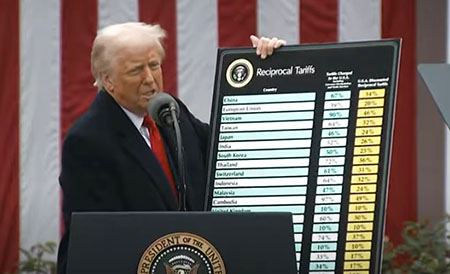by WorldTribune Staff, August 24, 2025 Real World News
If President Donald Trump’s tariffs policy is followed over the next 10 years, the funds from tariffs collected will results in a $4 trillion reduction in total U.S. deficits, according to the Congressional Budget Office (CBO).
 “As a result of the increases in tariff rates, revenues have been greater than we projected in January,” the CBO reported on Friday.
“As a result of the increases in tariff rates, revenues have been greater than we projected in January,” the CBO reported on Friday.
Garrett Ziegler, an aide to trade advisor Peter Navarro in the first Trump Administration, noted: “The goal is to SHIFT the burden of govt revenue from Americans to foreigners and/or importers. It’s simple. The long 19th century is our guide.”
“Through July, the Treasury reports that duties have totaled $136 billion, with $28 billion collected in July alone. On the basis of tariffs in place on January 6, we projected that customs duties would total $80 billion in fiscal year 2025 — an amount near the average of the previous five years.”
The effective tariff rate for goods imported into the United States has increased by about 18 percentage points in the first six months of the second Trump Administration compared to the last year of the Biden-Harris regime, the non-partisan CBO said.
“We project that increases in tariffs implemented during the period from January 6, 2025, to August 19 will decrease primary deficits (which exclude net outlays for interest) by $3.3 trillion if the higher tariffs persist for the 2025‒2035 period,” the CBO said.
“By reducing the need for federal borrowing, those tariff collections will also reduce federal outlays for interest by an additional $0.7 trillion. As a result, the changes in tariffs will reduce total deficits by $4.0 trillion altogether.”
Trump’s tariffs have generated so much revenue, so quickly, that he has even won over past skeptics.
“Although there are many legitimate concerns over the tariffs — including their impact on the economy and the level of uncertainty they are creating — policymakers should not repeal them without an adequate replacement for the revenue loss,” the Committee for a Responsible Federal Budget wrote earlier this month.
